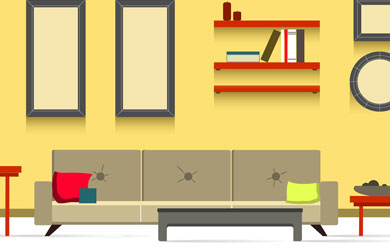
Design tips for a dementia-friendly home
The DSDC International Dementia Conference in Birmingham England this year will be a great place to share ideas, and carers and people with dementia are welcome.
The Alzheimer Society of Canada’s Mary Schulz is on the programme and we look forward to hearing from friends from around the world. At the Dementia Services Development Centre (DSDC), we do what we can to help families by providing information about what works and makes a difference.
There is a lot that can be tried, but not everything works. However, you can’t be sure until you DO try so here are some ideas. Your feedback about them is most welcome and we always want to hear about other things that you have found to make life a little easier.
The DSDC provides support on a range of issues including eating and drinking, heating and fuel and how to respond to difficulty and distress, but today I want to offer some of our basic tips for how design in your home can help.
- If you are staying in the same place, change as little as possible.. You can probably find your way around your own house in the dark because we all have a memory of familiar environments. That familiarity helps keep things calm. If you change something it may cause more trouble that it was worth.
- Increase the light level. If you are only going to make one change, this is it. The aging eye needs more light. Most people with dementia are older and if you can’t remember where anything is, increasing the light level helps you to find it without a fuss.
- Declutter. Does this sound contradictory to tip #1? Well, it has its advantages in that if you clear away a hazard like an old rug, you reduce the risk of trips and slips. But the person with dementia who agrees to you taking it away might forget by tomorrow and wonder if there have been robbers in the house. You have to strike the right balance between safety and unsettling the person.
- Keep down unnecessary noise. With dementia, it is hard to concentrate, so do what you can to help. We don’t notice a lot of noises usually because we can concentrate on what matters. Living with dementia, it is harder to concentrate, so try to “declutter” the sounds in your house by, for example, turning off the TV unless someone is watching. Sit quietly yourself and listen. It’s like a “noise audit”.
Visit our virtual care home for much more information on how design can help.
DSDC is conducting a big survey to find out what people really think about dementia. Can you donate ten minutes of your time to complete it for us?
We can make change happen with your help.
Dementia Services Development Centre
